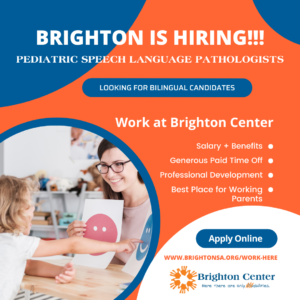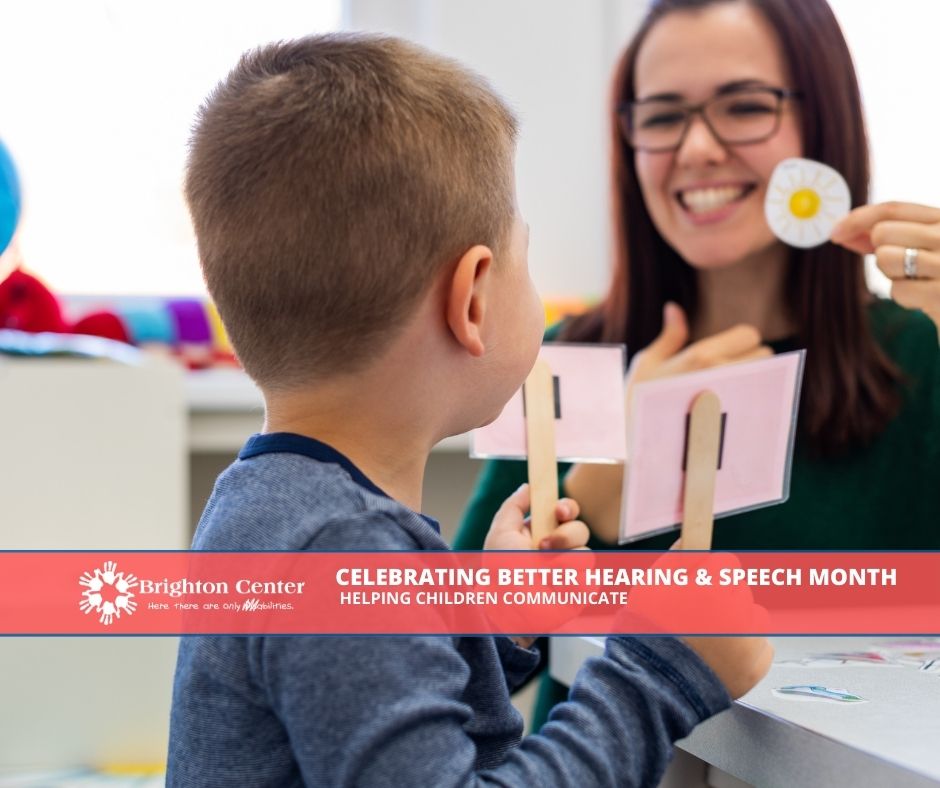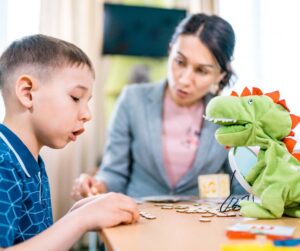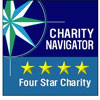Better Hearing and Speech with Pediatric Speech-Language Pathologists

Fun Facts About Pediatric Speech-Language Pathologists
- There are about 162,760 Speech-Language Pathologists working in the US!
- Famous people with a history of speech and articulation disorders: Thomas Jefferson, Marilyn Monroe, Winston Churchill, and Elton John.
- Speech-language pathologists ranked #31 on the top 100 jobs for 2023.
- The Speech Language Pathology field grew and became popular in the 1920s as SLPs treated soldiers with brain injuries returning from war.
How do I know if my child might benefit from Speech Therapy?
All children progress at different paces but communication disorders are prevalent in America and early intervention is key. It is extremely important to know what is and what isn’t normal when it comes to language and speech development and where working with a Pediatric Speech-Language Pathologist could help. Here are five of the most important red flags to look for regarding a potential speech/language delay:
1. Your Child doesn’t interact socially.
If your infant doesn’t babble (between 4 and 7 months), your baby only makes a few sounds or gestures, like pointing (between 7 and 12 months), or your infant doesn’t seem to understand what you or others are saying (between 7 months and 2 years old) there might be a concern.
2. Your Toddler Makes Only a Few Sounds, Words, or Gestures (12 to 18 months).
Most children start to say a few single words between 12 months and 18 months. Afterwards, between 1 1/2 and 2, they’re typically putting words together. On the other hand, if your child isn’t saying anything, or has an extremely limited vocabulary of words, they may have a speech disorder that may require future Speech Therapy.
3. You (and Others) Can’t Understand What Your Child Is Saying (18 months to 2 years).
It isn’t uncommon for moms and dads to be the only people who understand what their toddler is saying. Nevertheless, between 18 months and 2 years, parents shouldn’t have too much difficulty deciphering what their child is saying. Speech should be clear to a familiar listener by this age.
4. Your Child Hasn’t Started to Combine 2 or More Words Together By the Age of 2.
Usually, children begin combining two or more words together to make “sentences” at about 18 months: “My ball.” “Come Mama.” If between the ages of 1 1/2 and 3, children aren’t pairing two or more words with one another, parents may want to consult a Pediatric Speech-Language Pathologist for Speech Therapy services.
5. Your Child Struggles to Make Sounds or Say Words (2 1/2 to 4 years).
Some sounds are harder to pronounce than others. For instance, a “K” or a “G” sound doesn’t roll off the tongue for an 18-month-old (or even some 2-year-olds). Easier sounds, like ‘P,’ ‘B,’ and ‘M,’ shouldn’t be a problem for children after the age of 2. If your 2 1/2-year-old is still having trouble with “easier” sounds, or your 3- to 4-year-old is having trouble with “harder” sounds, consider it a red flag and give Speech Therapy consideration. According to statistics provided by the NIH and the NIDCD in 2016, nearly 1 in 12 (7.7%) of all U.S. children ages 3-17 has had a disorder related to voice, speech, language, or swallowing in the past 12 months.
If you suspect your baby, toddler, may have a communication disorder, Brighton Center is the place to be. Use our form to inquire about our services for kids.
Is a Pediatric Speech Language Pathologist a degreed physician?
 Becoming a Pediatric Speech Language Pathologist (SLP) takes a lot of time and dedication. You first obtain an undergraduate degree in communication sciences and disorder. Subsequently, you apply to a graduate school to receive a Master’s degree in Communication Sciences and Disorders/Speech-Language Pathology. Typically, individuals apply to at least 3-5 (or more!) graduate programs as these programs tend to be very competitive, and most only select about 35 or fewer applicants. After completing graduate school, individuals are required to take a National Exam named Speech-Language Pathology PRAXIS Exam in order to obtain a State Professional Licensure and/or American Speech-Language-Hearing Association (ASHA) Certificate of Clinical Competence in Speech-Language Pathology or those triple “C’s” you see at the end of our name titles (CCC-SLP).
Becoming a Pediatric Speech Language Pathologist (SLP) takes a lot of time and dedication. You first obtain an undergraduate degree in communication sciences and disorder. Subsequently, you apply to a graduate school to receive a Master’s degree in Communication Sciences and Disorders/Speech-Language Pathology. Typically, individuals apply to at least 3-5 (or more!) graduate programs as these programs tend to be very competitive, and most only select about 35 or fewer applicants. After completing graduate school, individuals are required to take a National Exam named Speech-Language Pathology PRAXIS Exam in order to obtain a State Professional Licensure and/or American Speech-Language-Hearing Association (ASHA) Certificate of Clinical Competence in Speech-Language Pathology or those triple “C’s” you see at the end of our name titles (CCC-SLP).
In addition to all the schoolwork and exams, we are required to obtain 400 clock hours of clinical experience in a variety of settings. After graduation and passing the national exam, SLPs must also complete an internship in order to receive a Certificate of Clinical Competence. The internship requires 36 weeks/1,260 hours/9 months of full-time supervised professional experience.
Then and only then can we truly call ourselves “CCC-SLP”. Becoming an Pediatric Speech Language Pathologist is a lot of dedication but the rewarding career that comes from all the hard work is all worth it!
In the SLP career field, we can work in a variety of settings such as: Early Childhood Intervention (ECI), outpatient clinics, inpatient/outpatient hospital settings, acute care and Intensive Care Unit (ICU) in hospitals, nursing homes, Long Term Acute Care (LTAC), schools, home health, colleges and universities, etc. Also, as a fully licensed SLP you can open your own private practice or home health company!
###

















